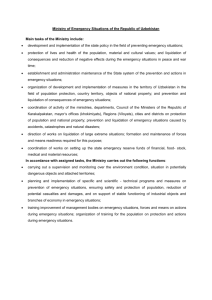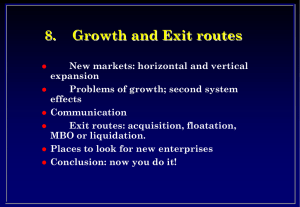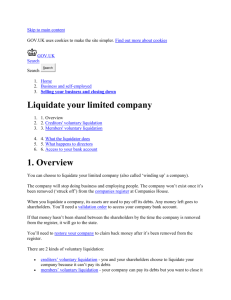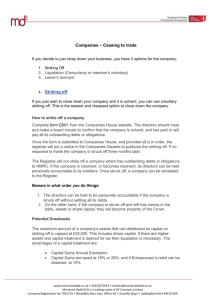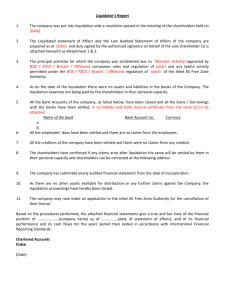Slide 1
advertisement
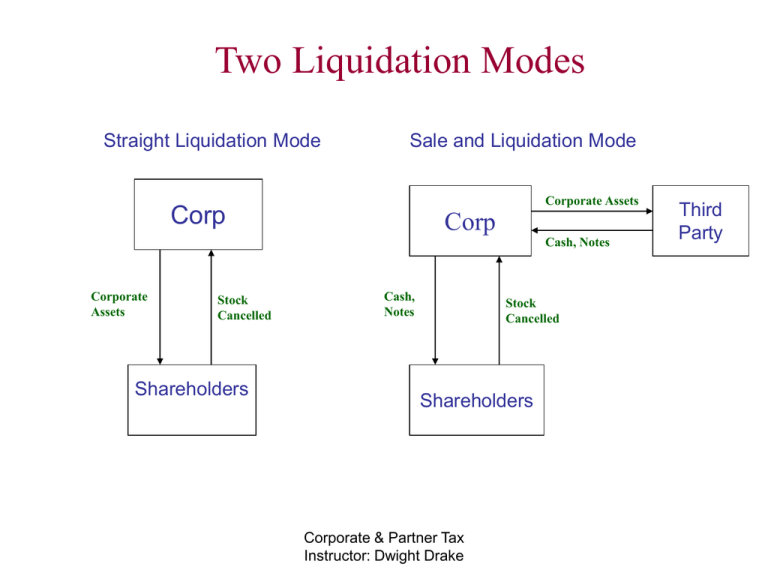
Two Liquidation Modes Straight Liquidation Mode Sale and Liquidation Mode Corporate Assets Corp Corp Cash, Notes Corporate Assets Stock Cancelled Shareholders Cash, Notes Stock Cancelled Shareholders Corporate & Partner Tax Instructor: Dwight Drake Third Party Complete Liquidation – Shareholder Impact General Rule: Per 331, complete liquidation treated as sale or exchange of stock, producing capital gain or loss equal to difference between cash and FMV of property received and shareholder’s basis in stock. Section 301 not apply. Timing Issues: - When did liquidation began and dividends (non-liquidating) distributions end. Fact question. Look to corporate resolutions and adoption of plan. - 453 installment sales treatment applies when liquidating distributions over time. Open transaction treatment very risky; appears trumped by 453. - 453 installment treatment permitted even as to installment obligations acquired by non-public corp in asset sell-off and distributed to shareholders. To qualify under 453, corp sale that created obligation must be with 12 month period after liquidation plan adopted and liquidation must be completed within same period. Inventory and “dealer” qualify only if part of bulk sale of assets. Corporate & Partner Tax Instructor: Dwight Drake Complete Liquidation – Corporation Impact General Rule: Per 336, Corp recognizes gain or loss on property distributed or sold as part of complete liquidation. 267 related-party loss limitations not apply in complete liquidation. (d)(1) Related Party Exception: No loss at all on distribution to related party (per 267) in complete liquidation if: - Distribution not pro rata, or - Distributed property acquired by corp in 351 transaction or as contribution to capital within 5 yrs of distribution (“Disqualified Property”). (d)(2) Tax Avoidance Exception: No built-in loss (loss at time of acquisition) disallowed if property acquired in 351 transaction or contribution to capital and principal purpose was to recognize loss on liquidation. If acquired within 2 yrs of plan of liquidation, bad purpose a done deal unless there is “clear and substantial relationship” between property and conduct of business and solid explanation. If outside 2yr window, probably safe except in “most rare” cases. Corporate & Partner Tax Instructor: Dwight Drake Partnership Liquidation 731 & 732 731: No gain or loss recognized to partner unless: - Gain to extent money distributed exceeds partner’s basis in partnership interest. - Loss recognized if only money and unrealized receivables and inventory distributed to extent basis in partner’s interest exceeds amount of money distributed and partnership’s basis in receivables and inventory. - Any recognized gain or loss is from sale or exchange of partnership interest. 732(b): If property distributed to partner in liquidation of partnership interest, basis in property shall equal partner’s interest in partnership less money receives in distribution. 751(b) Game: Applied full tilt. Note: 736 Roadmap not applicable on complete liquidation. Corporate & Partner Tax Instructor: Dwight Drake Complete Liquidation: Impact on Partnership General Rule: No gain or loss to partnership on distributions of property to liquidate a partner’s interest in partnership. 731(b) 751(b) Impact: To extent of 736(b) payments not reflect partner’s proportionate share of unrealized receivables and inventory, deemed distribution of additional receivables and inventory to partner followed by partners sales to partnership for cash. Impact is ordinary income to partner and increased basis in such assets to partnership (result of deemed by back). Partnership’s Assets Basis: No change per 734(a) unless 754 election made. If 754 election, basis in capital or 1231 assets (1) increased by gain recognized by distributee partner and excess of partnership basis in distributed property over basis to distributee under 732 and (d) decreased by loss recognized by distributee and excess of distributee basis over partnership’s basis. 708 Termination: Liquidation terminates partnership. Also deemed termination if 50% or more of partners’ interest in profits and capital sold within 12 month period. Old partnership terminated and new partnership formed. Complete carryovers, but tax year closed out and new elections. Corporate & Partner Tax Instructor: Dwight Drake S Corp Complete Liquidation – Shareholder Impact General Rule: Per 331, complete liquidation treated as sale or exchange of stock, producing capital gain or loss equal to difference between cash and FMV of property received and shareholder’s basis in stock. Note, shareholder stock basis increased by corporate gain, so often little or no tax due. Timing Issues: - 453 installment sales treatment applies when liquidating distributions over time. Open transaction treatment very risky; appears trumped by 453. - 453 installment treatment permitted even as to installment obligations acquired by non-public corp in asset sell-off and distributed to shareholders. To qualify under 453, corp sale that created obligation must be with 12 month period after liquidation plan adopted and liquidation must be completed within same period. Inventory and “dealer” qualify only if part of bulk sale of assets. Corporate & Partner Tax Instructor: Dwight Drake S Corp Complete Liquidation – Corporation Impact General Rule: Per 336, Corp recognizes gain or loss on property distributed or sold as part of complete liquidation. 267 related-party loss limitations not apply in complete liquidation. Gain or loss passed thru to shareholders. (d)(1) Related Party Exception: No loss at all on distribution to related party (per 267) in complete liquidation if: - Distribution note pro rata, or - Distributed property acquired by corp in 351 transaction or as contribution to capital within 5 yrs of distribution (“Disqualified Property”). (d)(2) Tax Avoidance Exception: No built-in loss (loss at time of acquisition) disallowed if property acquired in 351 transaction or contribution to capital and principal purpose was to recognize loss on liquidation. If acquired within 2 yrs of plan of liquidation, bad purpose a done deal unless there is “clear and substantial relationship” between property and conduct of business and solid explanation. If outside 2yr window, probably safe except in “most rare” cases. Corporate & Partner Tax Instructor: Dwight Drake
